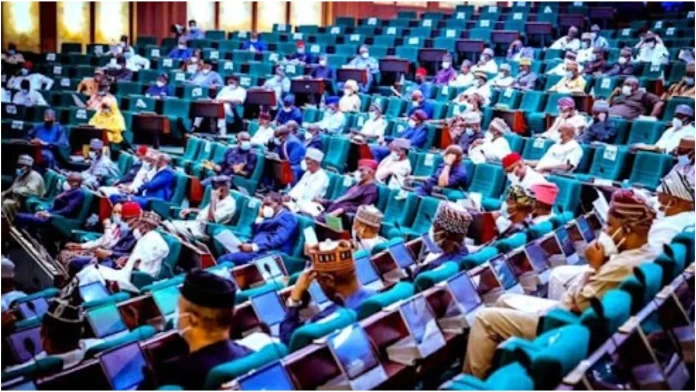It is troubling that Nigeria’s political leadership is rapidly descending into an embarrassing spectacle because too much attention is given to frivolities while poverty deepens.
The National Assembly in particular must avoid frivolities and focus on Nigeria’s pressing challenges.
Nigerians are currently facing the highest levels of actual and multidimensional poverty, soaring infant mortality rates, millions of out-of-school children, hunger, insecurity, and countless other challenges.
While citizens bear the crushing weight of various hardships due to misgovernance, those in power prioritize personal interests and political gamesmanship over the nation’s well-being. This mockery of leadership is not only unacceptable; it is a betrayal of the people’s trust.
Nigerians expect the leaders to be focusing and sacrificing solely on providing urgent, transformative solutions to the myriad of problems facing the country.
Regrettably, the national discourse is consumed by trivialities, whether it is allegations of sexual harassment or budget padding in the National Assembly.
Following the lackluster performance of the 9th National Assembly, which earned it the label “Rubber Stamp Assembly,” hopes were high that the 10th Assembly would usher in a new era of legislative vibrancy.
For the skeptics, the declining quality of lawmaking and oversight under the Godswill Akpabio-led Assembly has only validated their concerns.
Since the commencement of the Fourth Republic on May 29, 1999, the 10th Senate is the seventh of its kind, while the last (the Ninth Senate) was the sixth. The First Senate in the Fourth Republic was the Fourth Senate (1999- 2003), and the Second, which lasted from 2003 to 2007 was the Fifth Senate.
The third was the sixth Senate and it lasted from 2007 to 2011, while the fourth was the Seventh Senate, which was in place from 2011 to 2015. The fifth was the 8th Senate which made laws for the country from 2015 to 2019, and the sixth was the Ahmad Lawan-led Senate. It held court from 2019 to 2023.
Since the effectiveness of governance is closely linked to the quality of legislative bodies, as they play a crucial role in representing the electorate, making laws, and overseeing the government, a lackluster parliament can pose a significant challenge to good governance.
Essentially, while a people-centred parliament is hallmarked by how responsive and accountable it has been, openness in its operations and decision-making processes helps build trust with the public, just as a dynamic parliament anticipates future challenges and takes initiative to create legislation and policies that address these issues in a forward-thinking manner.
On the other hand, a parliament that lacks vigour perpetrates poor representation and may fail to represent the interests and concerns of the populace effectively, leading to policies that do not reflect the public’s needs. It also inhibits robust debate on pressing issues, leading to consensus-building that overlooks minority opinions or key perspectives, resulting in poorly thought-out policies.
While parliaments are essential for holding the executive accountable, a parliament that lacks vitality may not challenge government actions or expenditures rigorously, leading to potential abuses of power or corruption.
Godswill Akpabio’s emergence as the number three man in Nigeria was characterised by high-stakes political intrigues, horse-trading and severe bickering across diverse political platforms. Somehow, the might of what propelled him pushed down every obstacle and he had his way. But since taking the reins, Akpabio’s time at the helm has been largely topsy-turvy with the bulk of the controversies having him as the lead character.
While the status of the National Assembly diminishes daily, as reflected by its actions, inaction, quality of debates, lowered ethical standards, scant commitment to dialogue, and poor constituent communication, one list that is lengthening is the list of scandals that the National Assembly is churning out effectively.
“Rather than life-changing legislation, the National Assembly is becoming notorious for mundane happenings and shenanigans. Nigerians demand proper representation from their lawmakers, who are some of the best-paid in the world.”
Rather than life-changing legislation, the National Assembly is becoming notorious for mundane happenings and shenanigans. Nigerians demand proper representation from their lawmakers, who are some of the best-paid in the world.
A lackluster parliament can severely undermine good governance by failing to represent the populace, produce effective legislation, and hold the executive accountable. Conversely, a pro-people parliament characterised by responsiveness, transparency, accountability, and inclusiveness can enhance democratic governance, foster public trust, and ultimately lead to improved societal outcomes.
Cultivating these attributes should be a priority for any democratic society aiming for effective governance. Anything short of this, democracy will die a gradual death. Nigerians demand more from their lawmakers.
There should be a clear commitment to high ethical standards, which ensures that lawmakers act in the public interest, reducing the likelihood of corruption and fostering a culture of integrity.
To be truthful, it is not democracy that Nigeria is currently operating, because we do not have the institution that delivers democracy. There must be a guiding angel that will deliver the democrat. That person must first of all believe in the rule of law.
The National Assembly should purge itself of indolence and disregard for the people’s interest. In recent times the Senate, which ought to be above board and suspicion, has descended into a house of scandals.
No meaningful legislation has emerged from the hallowed chambers to show determination to protect the masses’ interest. The 10th Senate has shown a predilection for political muscle flexing.
Nigeria has been governed like a reality TV show while millions suffer for so long. It is time for a genuine leadership rooted in character, competence, capacity, consistency, compassion, and urgency. We need a leadership that prioritizes education, healthcare, and poverty alleviation.
Anything less threatens the nation’s stability, undermines the present, and betrays Nigeria’s future.

